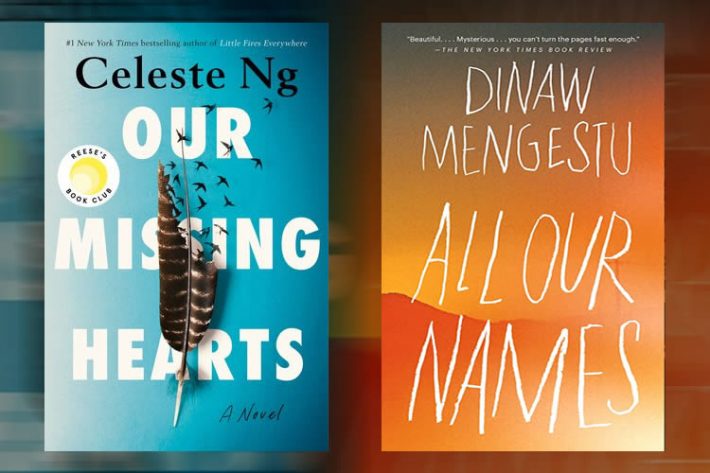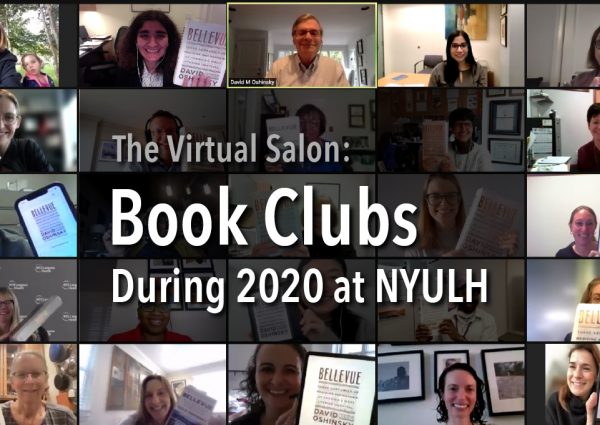Howard Trachtman, a contributing editor to the NYU Literature, Arts, and Medicine Database, recently annotated two novels, Our Missing Hearts and All Our Names. Because of the common themes and their contemporary relevance, and because Howard felt it was both important and rewarding to read the two novels together——we asked him to submit a short essay making his case.
I read all the time. But vacations are still special. I look forward to stuffing two or three books into the side compartment of my suitcase and having the extra time and freedom to read over the next week or two. Usually, I pick one fast page-turner and one or two other more demanding books that have accumulated on my night table and that I have procrastinated starting. Other than being able to fit into my luggage, I do not approach vacation books thematically. So, on my most recent vacation, I was caught off guard when two of the books I read – Our Missing Hearts, the new novel by Celeste Ng, and an older work by Dinaw Mengestu, All Our Names – unexpectedly had a shared impact that is so much of the moment. I hope I can persuade you to read them in tandem.
These two books are vastly different in style and tone, and I have described them in the two separate annotations; one novel is dark, almost mystical, and the other, grounded in the all-too-hard real world. What these two novels share, however, besides a sense of grave personal danger and a powerful readability, is the heavy human cost of our political war zones. In Our Missing Hearts the conflict is about personal identity and the battle waged against the Other—in this case, Asian-Americans. All Our Names is about national revolutions and territorial control. In both stories, the warring factions threaten the physical erasure of the opponent’s presence, obliteration from the collective memory. And in both books the bonds between parent and child, lovers, and friends are sacrificed on the unholy altar of collective group identity. The protagonists in each case are unable to overcome societal pressures and their deep human ties are violently ripped apart.
Each novel effectively captures an aspect of this war against human connectedness and love. Ng’s book is very dark and mysterious. Much of the action occurs off the beaten track in hidden broken spaces of refuge The atmosphere and tone aptly reflect the deep-seated prejudice and often-unspoken hatred against people who are different. The novel’s overarching atmosphere of fear, and its placement of much of the action in dark hidden spaces captures the destructive beliefs that fuel the anti-Asian movement in the futuristic America and enable acceptance of the “replacement” program that punitively separates children from the parents.
The tale in All Our Names is more grounded in the visible real world. There is escalating political and martial drama and gradual disclosure of more and more facts about the identity and life circumstances of the key characters; but these are facts which were there all along for the reader to see. Unlike the solitary individuals and the intense interiority of Ng’s novel, the killing and mayhem in All Our Names is out in the open. The carnage is in the streets of the villages, the central student square of the university. It is a novelistic version of what is happening today in Ukraine and in African countries like Mali and Burkina Faso. In an eerily similar and tragic way, Our Missing Hearts reminds the reader all too clearly of the recent rise in demonization of and violence against Asian-Americans in our own country in the wake of the COVID-19 pandemic.
The novels have totally different story lines, but the emotions engendered by each play off the other. I have almost nothing in common with the protagonists of these two books. There are some who assert that students should only be asked to read what they think they will understand from their own personal perspective. I suggest that as readers we should try to hear the voice speaking to us from within a book and learn from it regardless of the setting or cast of characters. Each novel on its own is a singular achievement and worth reading. But reading both books back-to-back is a reminder of the profound human cost on the individual level of war in all its guises, whether that war is against the individual by a government or the government by an individual. It allows us to look at powerful issues in today’s world at the comfortable remove of fiction, but it is also an uncomfortable reminder that art often imitates life, and of how much work remains to be done to repair the world.








